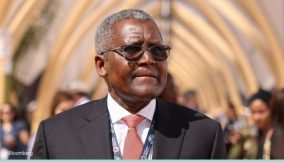Microfinance bank (MFB) loans are not something anyone can go for but I venture into it, due to the condition of things, said Lawrence Okafor, who deals in electrical parts in Lagos.
Okafor said it was not advisable for a business that is starting to borrow money from the MFBs because they do not give more than N30,000 credit and that the money may end up in feeding the family.
“Their interest rate is too high. If you borrow N30,000 you pay N10,000 interest rate upfront. In some cases you pay N4,000 every week for nine weeks,” Okafor said.
Another customer of one of the top microfinance banks in the country, who gave her name as Mama Ngozi, runs a bookshop at Mushin. She borrowed N250,000 two years ago at a five percent interest rate, but could not completely repay the loan because her business was not growing due to economic and environmental challenges.
Another customer, who gave her name simply as Funmi, a caterer at Ipaja, Lagos, borrowed N100,000 last year from a top microfinance bank but could not borrow more because she still has N10,000 balance to complete her loan repayment. She paid N20,000 to N21,000 monthly.
“I have a catering contract I am pursuing. If I see a microfinance bank that can lend me money, I will be happy and would repay the loan. There should be no fear of default,” she said.
One operator of a MFB, who was reluctant to comment extensively, said that the cost of borrowing was too high and that they gave loans based on how they sourced the fund.
There are about 882 Microfinance banks as of December 31, 2021, according to the data obtained from the CBN.
Last month, the apex bank revoked the operating licences of 132 MFBs. The revocation of licences was due to failure to comply with the obligations imposed on the banks by their regulator in accordance with the provisions of Banks and Other Financial Institutions Act (BOFIA) 2020, Act No. 5, Godwin Emefiele, governor of the CBN, disclosed in an official Gazette dated May 22, 2023.
In September 2010, the CBN revoked the operating licences of 224 MFBs, making a total of 356 of microfinance banks revoked in 13 years by the banking sector regulator.
BusinessDay visited one of the closed MFB in Lagos, Eyowo Microfinance Bank, and saw the bank closed with a notice from the Nigeria Deposit Insurance Corporation (INDIC) to the depositor.
The security man at the defunct bank said they have been talking to their customers and there is a form from NDIC or CBN the customers are meant to submit to get their money back.
A visit to the NDIC office in Lagos revealed that customers need to come with a passport, means of identification and a passbook or statement of account to fill a form, pending when the corporation begins to pay depositors.
Following the revocation of the MFBs licences, the NDIC had assured depositors of the closed banks’ speedy payment of their insured sums.
Bello Hassan, the managing director of the corporation, said, “As liquidator, the corporation has also put machinery in motion to commence sales of assets of the defunct banks as well as recover debts owed to them in order to declare liquidation dividends on pro rata basis to the affected depositors with claims exceeding the maximum insured sums of N200,000.00 for MFBs and N500,000.00 for PMBs.”
Join BusinessDay whatsapp Channel, to stay up to date
Open In Whatsapp





